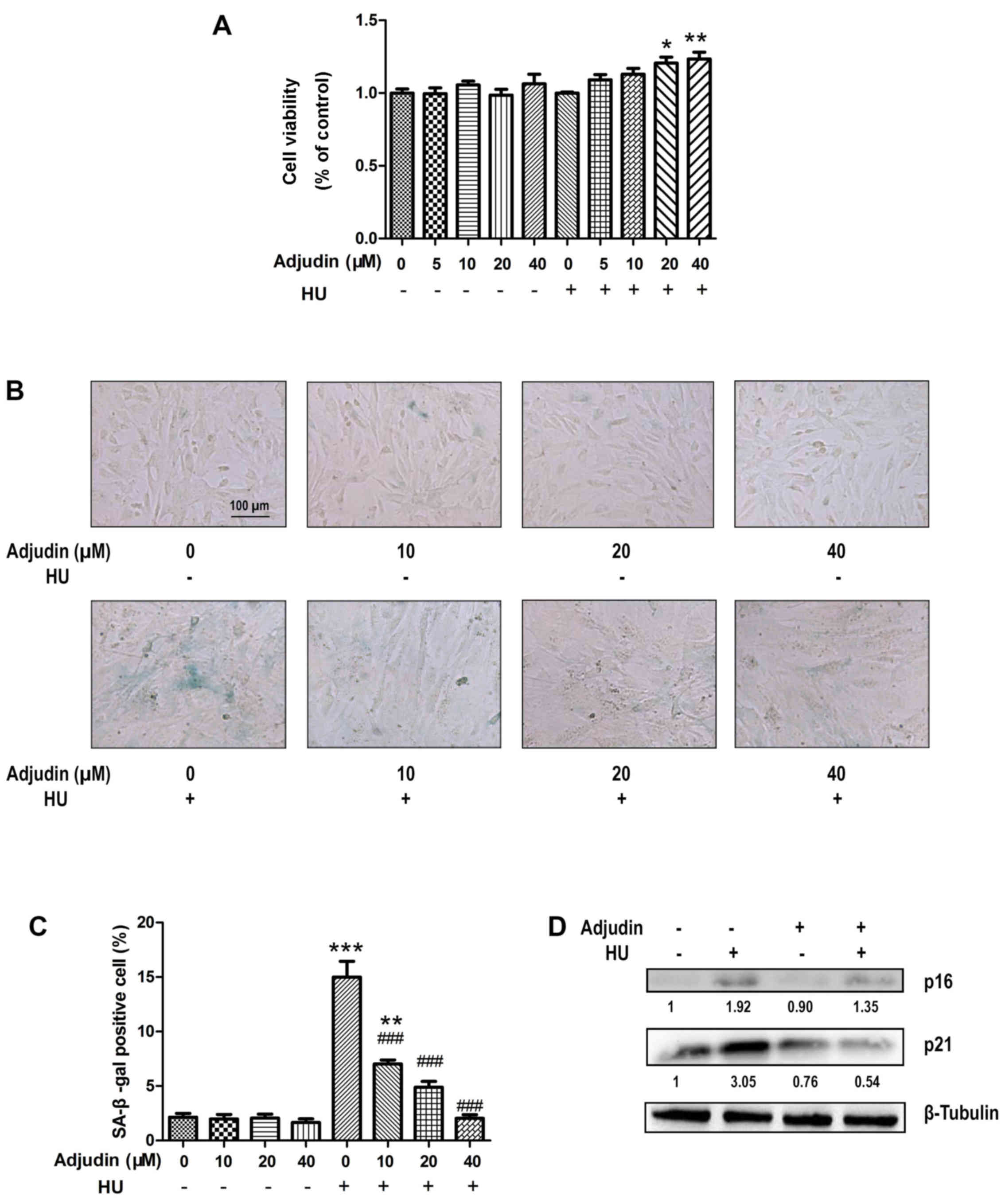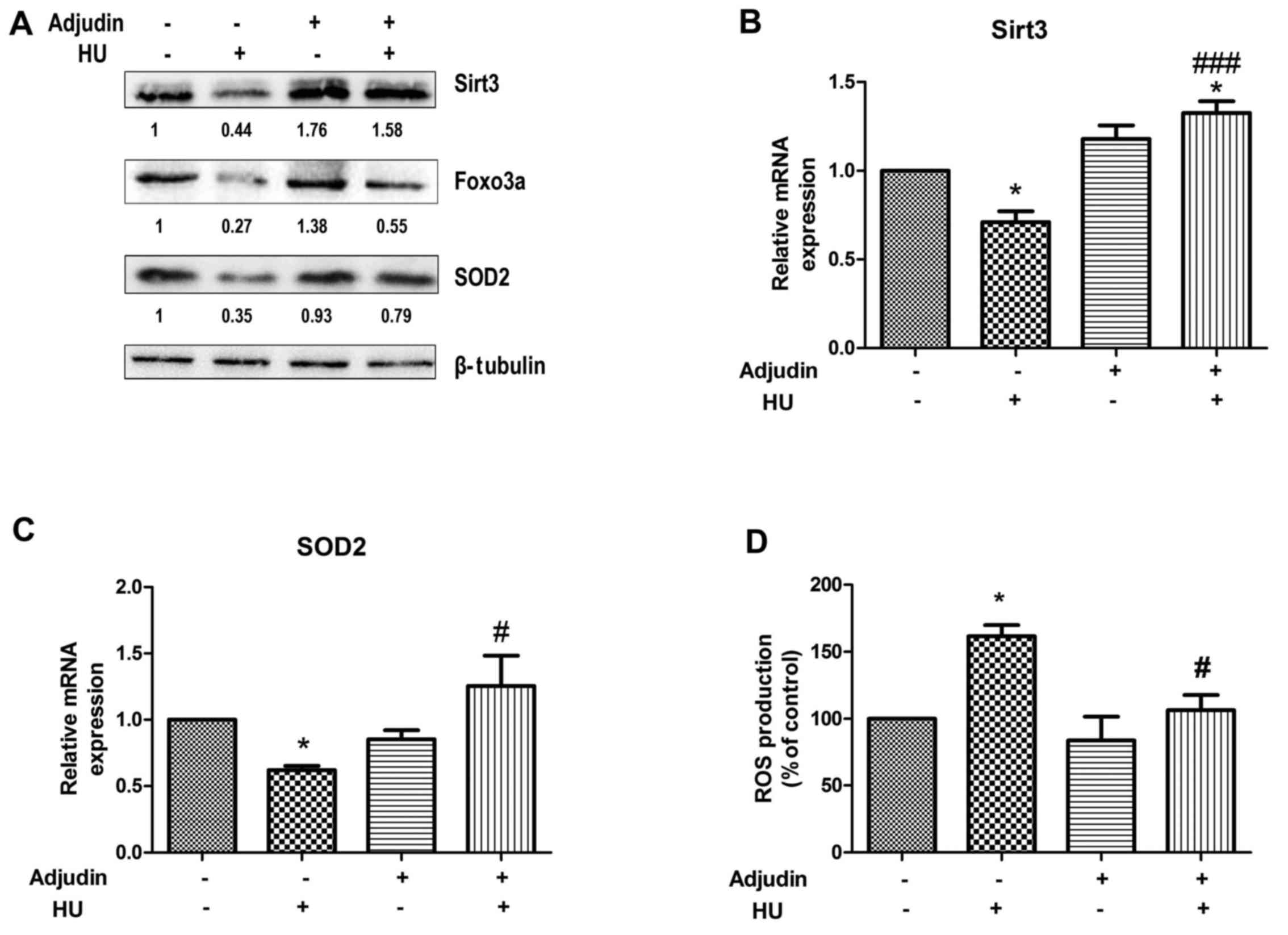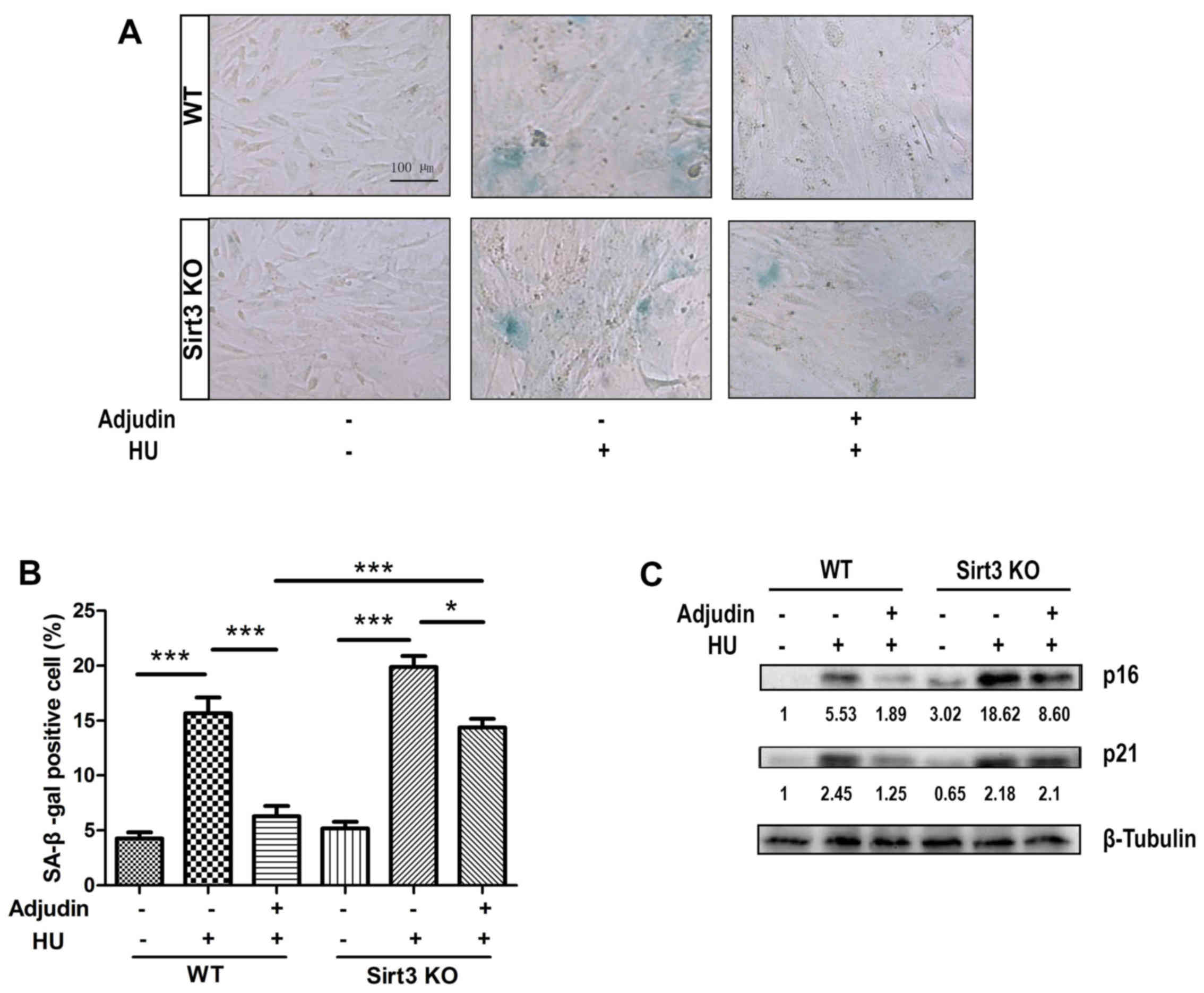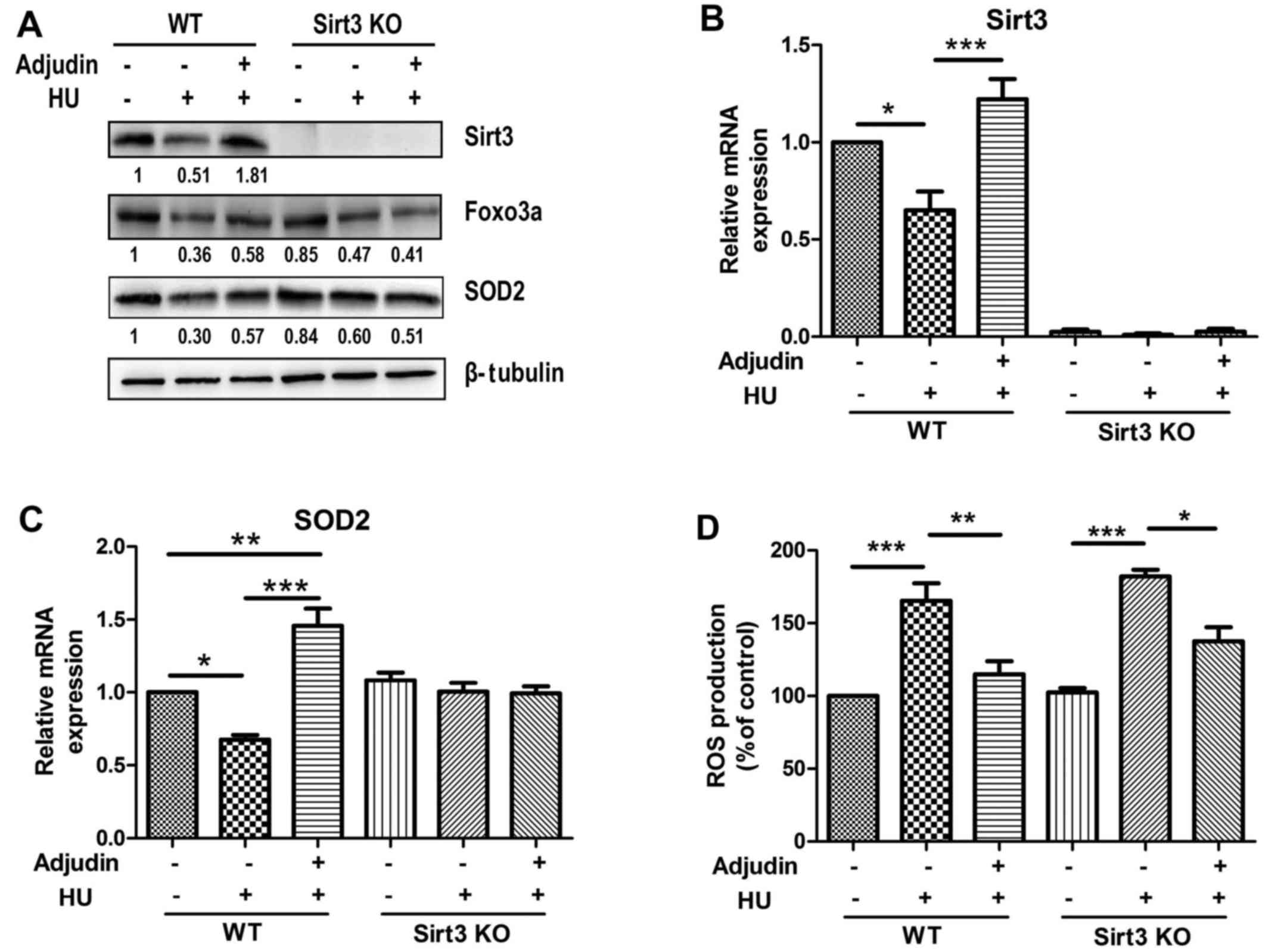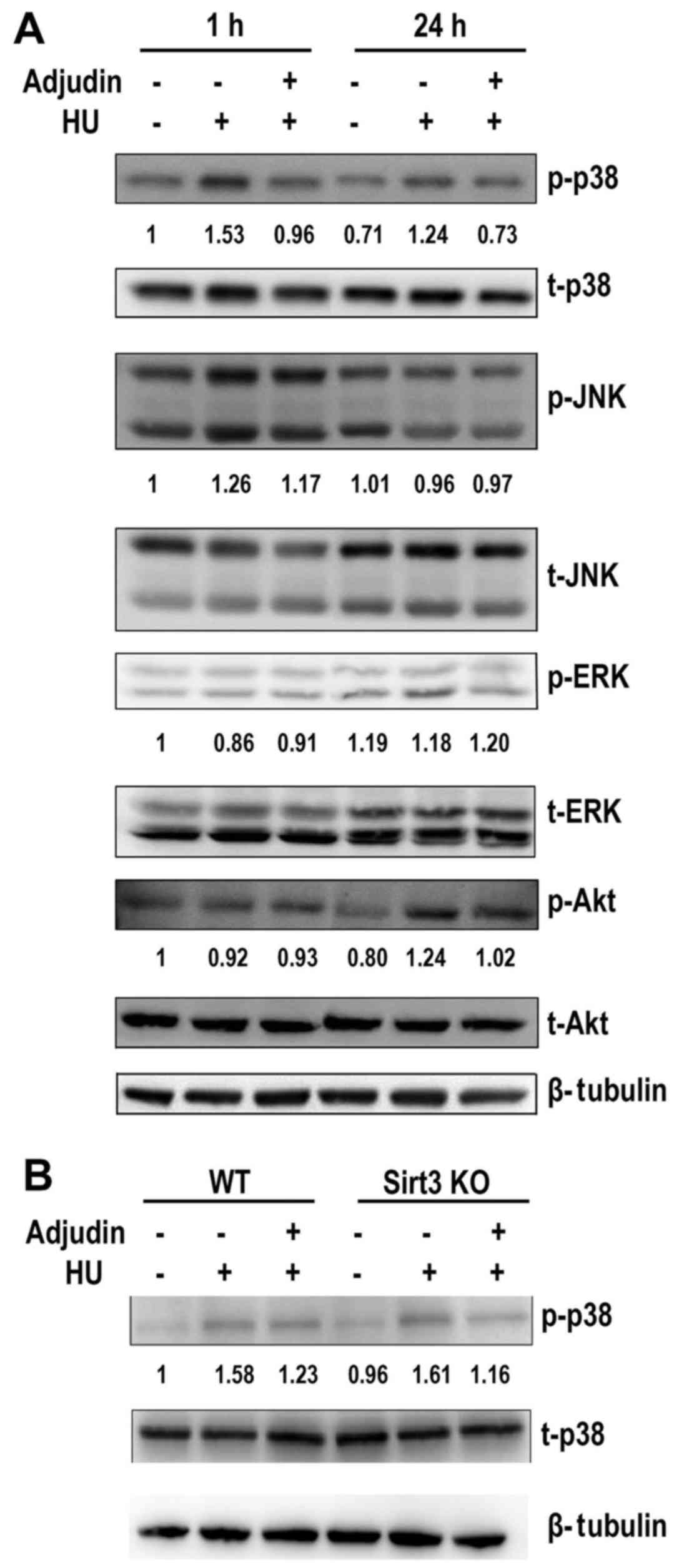|
1
|
Flatt T: A new definition of aging? Front
Genet. 3:1482012. View Article : Google Scholar : PubMed/NCBI
|
|
2
|
Liao CY and Kennedy BK: SIRT6, oxidative
stress, and aging. Cell Res. 26:143–144. 2016. View Article : Google Scholar : PubMed/NCBI
|
|
3
|
López-Otín C, Blasco MA, Partridge L,
Serrano M and Kroemer G: The hallmarks of aging. Cell.
153:1194–1217. 2013. View Article : Google Scholar : PubMed/NCBI
|
|
4
|
Childs BG, Durik M, Baker DJ and van
Deursen JM: Cellular senescence in aging and age-related disease:
From mechanisms to therapy. Nat Med. 21:1424–1435. 2015. View Article : Google Scholar : PubMed/NCBI
|
|
5
|
Campisi J: Aging, cellular senescence, and
cancer. Annu Rev Physiol. 75:685–705. 2013. View Article : Google Scholar
|
|
6
|
Harman D: The biologic clock: The
mitochondria? J Am Geriatr Soc. 20:145–147. 1972. View Article : Google Scholar : PubMed/NCBI
|
|
7
|
Lin MT and Beal MF: Mitochondrial
dysfunction and oxidative stress in neurodegenerative diseases.
Nature. 443:787–795. 2006. View Article : Google Scholar : PubMed/NCBI
|
|
8
|
Frye RA: Characterization of five human
cDNAs with homology to the yeast SIR2 gene: Sir2-like proteins
(sirtuins) metabolize NAD and may have protein
ADP-ribosyltransferase activity. Biochem Biophys Res Commun.
260:273–279. 1999. View Article : Google Scholar : PubMed/NCBI
|
|
9
|
Kaeberlein M, McVey M and Guarente L: The
SIR2/3/4 complex and SIR2 alone promote longevity in Saccharomyces
cerevisiae by two different mechanisms. Genes Dev. 13:2570–2580.
1999. View Article : Google Scholar : PubMed/NCBI
|
|
10
|
Lombard DB, Alt FW, Cheng HL, Bunkenborg
J, Streeper RS, Mostoslavsky R, Kim J, Yancopoulos G, Valenzuela D,
Murphy A, et al: Mammalian Sir2 homolog SIRT3 regulates global
mitochondrial lysine acetylation. Mol Cell Biol. 27:8807–8814.
2007. View Article : Google Scholar : PubMed/NCBI
|
|
11
|
Ahn BH, Kim HS, Song S, Lee IH, Liu J,
Vassilopoulos A, Deng CX and Finkel T: A role for the mitochondrial
deacetylase Sirt3 in regulating energy homeostasis. Proc Natl Acad
Sci USA. 105:14447–14452. 2008. View Article : Google Scholar : PubMed/NCBI
|
|
12
|
Samant SA, Zhang HJ, Hong Z, Pillai VB,
Sundaresan NR, Wolfgeher D, Archer SL, Chan DC and Gupta MP: SIRT3
deacetylates and activates OPA1 to regulate mitochondrial dynamics
during stress. Mol Cell Biol. 34:807–819. 2014. View Article : Google Scholar :
|
|
13
|
Hirschey MD, Shimazu T, Goetzman E, Jing
E, Schwer B, Lombard DB, Grueter CA, Harris C, Biddinger S,
Ilkayeva OR, et al: SIRT3 regulates mitochondrial fatty-acid
oxidation by reversible enzyme deacetylation. Nature. 464:121–125.
2010. View Article : Google Scholar : PubMed/NCBI
|
|
14
|
Jing E, O'Neill BT, Rardin MJ,
Kleinridders A, Ilkeyeva OR, Ussar S, Bain JR, Lee KY, Verdin EM,
Newgard CB, et al: Sirt3 regulates metabolic flexibility of
skeletal muscle through reversible enzymatic deacetylation.
Diabetes. 62:3404–3417. 2013. View Article : Google Scholar : PubMed/NCBI
|
|
15
|
Papa L and Germain D: SirT3 regulates the
mitochondrial unfolded protein response. Mol Cell Biol. 34:699–710.
2014. View Article : Google Scholar :
|
|
16
|
Onyango P, Celic I, McCaffery JM, Boeke JD
and Feinberg AP: SIRT3, a human SIR2 homologue, is an NAD-dependent
deacetylase localized to mitochondria. Proc Natl Acad Sci USA.
99:13653–13658. 2002. View Article : Google Scholar : PubMed/NCBI
|
|
17
|
Feldman JL, Baeza J and Denu JM:
Activation of the protein deacetylase SIRT6 by long-chain fatty
acids and widespread deacylation by mammalian sirtuins. J Biol
Chem. 288:31350–31356. 2013. View Article : Google Scholar : PubMed/NCBI
|
|
18
|
Bao X, Wang Y, Li X, Li XM, Liu Z, Yang T,
Wong CF, Zhang J, Hao Q and Li XD: Identification of ‘erasers’ for
lysine crotonylated histone marks using a chemical proteomics
approach. eLife. Nov 4–2014. View Article : Google Scholar
|
|
19
|
Kim SC, Sprung R, Chen Y, Xu Y, Ball H,
Pei J, Cheng T, Kho Y, Xiao H, Xiao L, et al: Substrate and
functional diversity of lysine acetylation revealed by a proteomics
survey. Mol Cell. 23:607–618. 2006. View Article : Google Scholar : PubMed/NCBI
|
|
20
|
Floridi A, Paggi MG, D'Atri S, De Martino
C, Marcante ML, Silvestrini B and Caputo A: Effect of lonidamine on
the energy metabolism of Ehrlich ascites tumor cells. Cancer Res.
41:4661–4666. 1981.PubMed/NCBI
|
|
21
|
Cheng CY, Silvestrini B, Grima J, Mo MY,
Zhu LJ, Johansson E, Saso L, Leone MG, Palmery M and Mruk D: Two
new male contraceptives exert their effects by depleting germ cells
prematurely from the testis. Biol Reprod. 65:449–461. 2001.
View Article : Google Scholar : PubMed/NCBI
|
|
22
|
Xia W and Geng K: A sirtuin activator and
an anti-inflammatory molecule-multifaceted roles of adjudin and its
potential applications for aging-related diseases. Semin Cell Dev
Biol. 59:71–78. 2016. View Article : Google Scholar : PubMed/NCBI
|
|
23
|
Shao J, Liu T, Xie QR, Zhang T, Yu H, Wang
B, Ying W, Mruk DD, Silvestrini B, Cheng CY, et al: Adjudin
attenuates lipopolysaccharide (LPS)- and ischemia-induced
microglial activation. J Neuroimmunol. 254:83–90. 2013. View Article : Google Scholar
|
|
24
|
Quan Y, Xia L, Shao J, Yin S, Cheng CY,
Xia W and Gao WQ: Adjudin protects rodent cochlear hair cells
against gentamicin ototoxicity via the SIRT3-ROS pathway. Sci Rep.
5:81812015. View Article : Google Scholar : PubMed/NCBI
|
|
25
|
Xia W, Mruk DD and Cheng CY: C-type
natriuretic peptide regulates blood-testis barrier dynamics in
adult rat testes. Proc Natl Acad Sci USA. 104:3841–3846. 2007.
View Article : Google Scholar : PubMed/NCBI
|
|
26
|
Krakoff IH, Brown NC and Reichard P:
Inhibition of ribonu-cleoside diphosphate reductase by hydroxyurea.
Cancer Res. 28:1559–1565. 1968.PubMed/NCBI
|
|
27
|
Moore EC and Hurlbert RB: The inhibition
of ribonucleoside diphosphate reductase by hydroxyurea, guanazole
and pyrazolo-imidazole (IMPY). Pharmacol Ther. 27:167–196. 1985.
View Article : Google Scholar
|
|
28
|
Yeo EJ, Hwang YC, Kang CM, Kim IH, Kim DI,
Parka JS, Choy HE, Park WY and Park SC: Senescence-like changes
induced by hydroxyurea in human diploid fibroblasts. Exp Gerontol.
35:553–571. 2000. View Article : Google Scholar : PubMed/NCBI
|
|
29
|
Park MS, Choi JS, Lee W, Yang YJ, Kim J,
Lee GJ, Kim SS, Park SH, Kim SC, et al: Pharmacogenomic analysis
indicates potential of 1,5-isoquinolinediol as a universal
anti-aging agent for different tissues. Oncotarget. 6:17251–17260.
2015.PubMed/NCBI
|
|
30
|
Dong CM, Wang XL, Wang GM, Zhang WJ, Zhu
L, Gao S, Yang DJ, Qin Y, Liang QJ, et al: A stress-induced
cellular aging model with postnatal neural stem cells. Cell Death
Dis. 5:e11162014. View Article : Google Scholar : PubMed/NCBI
|
|
31
|
Min JN, Tian Y, Xiao Y, Wu L, Li L and
Chang S: The mINO80 chromatin remodeling complex is required for
efficient telomere replication and maintenance of genome stability.
Cell Res. 23:1396–1413. 2013. View Article : Google Scholar : PubMed/NCBI
|
|
32
|
Moiseeva O, Mallette FA, Mukhopadhyay UK,
Moores A and Ferbeyre G: DNA damage signaling and p53-dependent
senescence after prolonged beta-interferon stimulation. Mol Biol
Cell. 17:1583–1592. 2006. View Article : Google Scholar : PubMed/NCBI
|
|
33
|
Stewart SA, Ben-Porath I, Carey VJ,
O'Connor BF, Hahn WC and Weinberg RA: Erosion of the telomeric
single-strand overhang at replicative senescence. Nat Genet.
33:492–496. 2003. View
Article : Google Scholar : PubMed/NCBI
|
|
34
|
Di Micco R, Sulli G, Dobreva M, Liontos M,
Botrugno OA, Gargiulo G, dal Zuffo R, Matti V, d'Ario G, et al:
Interplay between oncogene-induced DNA damage response and
heterochromatin in senescence and cancer. Nat Cell Biol.
13:292–302. 2011. View
Article : Google Scholar : PubMed/NCBI
|
|
35
|
Kim WY and Sharpless NE: The regulation of
INK4/ARF in cancer and aging. Cell. 127:265–275. 2006. View Article : Google Scholar : PubMed/NCBI
|
|
36
|
Herbig U, Jobling WA, Chen BP, Chen DJ and
Sedivy JM: Telomere shortening triggers senescence of human cells
through a pathway involving ATM, p53, and p21(CIP1), but not
p16(INK4a). Mol Cell. 14:501–513. 2004. View Article : Google Scholar : PubMed/NCBI
|
|
37
|
Baur JA, Ungvari Z, Minor RK, Le Couteur
DG and de Cabo R: Are sirtuins viable targets for improving
healthspan and lifespan? Nat Rev Drug Discov. 11:443–461. 2012.
View Article : Google Scholar : PubMed/NCBI
|
|
38
|
McDonnell E, Peterson BS, Bomze HM and
Hirschey MD: SIRT3 regulates progression and development of
diseases of aging. Trends Endocrinol Metab. 26:486–492. 2015.
View Article : Google Scholar : PubMed/NCBI
|
|
39
|
Sundaresan NR, Bindu S, Pillai VB, Samant
S, Pan Y, Huang JY, Gupta M, Nagalingam RS, Wolfgeher D, Verdin E,
et al: SIRT3 blocks aging-associated tissue fibrosis in mice by
deacetylating and activating glycogen synthase kinase 3β. Mol Cell
Biol. 36:678–692. 2015. View Article : Google Scholar : PubMed/NCBI
|
|
40
|
Someya S, Yu W, Hallows WC, Xu J, Vann JM,
Leeuwenburgh C, Tanokura M, Denu JM and Prolla TA: Sirt3 mediates
reduction of oxidative damage and prevention of age-related hearing
loss under caloric restriction. Cell. 143:802–812. 2010. View Article : Google Scholar : PubMed/NCBI
|
|
41
|
Jacobs KM, Pennington JD, Bisht KS,
Aykin-Burns N, Kim HS, Mishra M, Sun L, Nguyen P, Ahn BH, Leclerc
J, et al: SIRT3 interacts with the daf-16 homolog FOXO3a in the
mitochondria, as well as increases FOXO3a dependent gene
expression. Int J Biol Sci. 4:291–299. 2008. View Article : Google Scholar : PubMed/NCBI
|
|
42
|
Tseng AH, Shieh SS and Wang DL: SIRT3
deacetylates FOXO3 to protect mitochondria against oxidative
damage. Free Radic Biol Med. 63:222–234. 2013. View Article : Google Scholar : PubMed/NCBI
|
|
43
|
Qiu X, Brown K, Hirschey MD, Verdin E and
Chen D: Calorie restriction reduces oxidative stress by
SIRT3-mediated SOD2 activation. Cell Metab. 12:662–667. 2010.
View Article : Google Scholar : PubMed/NCBI
|
|
44
|
Tao R, Vassilopoulos A, Parisiadou L, Yan
Y and Gius D: Regulation of MnSOD enzymatic activity by Sirt3
connects the mitochondrial acetylome signaling networks to aging
and carcinogenesis. Antioxid Redox Signal. 20:1646–1654. 2014.
View Article : Google Scholar :
|
|
45
|
Salminen A, Ojala J, Kaarniranta K and
Kauppinen A: Mitochondrial dysfunction and oxidative stress
activate inflam-masomes: Impact on the aging process and
age-related diseases. Cell Mol Life Sci. 69:2999–3013. 2012.
View Article : Google Scholar : PubMed/NCBI
|
|
46
|
Sena LA and Chandel NS: Physiological
roles of mitochondrial reactive oxygen species. Mol Cell.
48:158–167. 2012. View Article : Google Scholar : PubMed/NCBI
|
|
47
|
Li X, Fang P, Mai J, Choi ET, Wang H and
Yang XF: Targeting mitochondrial reactive oxygen species as novel
therapy for inflammatory diseases and cancers. J Hematol Oncol.
6:192013. View Article : Google Scholar : PubMed/NCBI
|
|
48
|
Freund A, Patil CK and Campisi J: p38MAPK
is a novel DNA damage response-independent regulator of the
senescence-associated secretory phenotype. EMBO J. 30:1536–1548.
2011. View Article : Google Scholar : PubMed/NCBI
|
|
49
|
Bakunina N, Pariante CM and Zunszain PA:
Immune mechanisms linked to depression via oxidative stress and
neuroprogression. Immunology. 144:365–373. 2015. View Article : Google Scholar : PubMed/NCBI
|
|
50
|
Hawkes HJ, Karlenius TC and Tonissen KF:
Regulation of the human thioredoxin gene promoter and its key
substrates: A study of functional and putative regulatory elements.
Biochim Biophys Acta. 1840:303–314. 2014. View Article : Google Scholar
|















